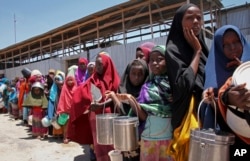Malaysia is sending troops to Somalia as part of the humanitarian mission to avert famine and save the lives of thousands of people, Somali government officials and diplomats said on Saturday.
“I can confirm the report and the details will be given when the delegation led by Somali Deputy Prime Minister Mohamed Omar Arte, which has been visiting Malaysia, returns to the country,” Somalia’s information minister, Mohamed Abdi Hayir Mareye, told VOA Somali.
Addressing the media in Kuala Lumpur, Malaysian Defense Minister Datuk Seri Hishammuddin said his country will send three officers and 17 personnel from the Armed Forces Medical Core to Somalia.
“The infantry unit, consisting of an officer and 10 personnel, will provide security for the delegation. The food and medical supplies will be flown to Somalia by a Hercules C-130 aircraft,” the minister said.
The minister said the troops, along with assets, will be mobilized from Riyadh, Saudi Arabia, where Malaysia stationed a small number of troops to help in the evacuation of Malaysians in Yemen. But many consider them as part of Riyadh’s military coalition to battle the Houthi militia in Yemen.
A Somali diplomat in the delegation, who asked not to be named because he was not authorized to speak about the issue, said the decision was reached on Tuesday following a meeting between Somalia Deputy Prime Minister Arteh and senior Malaysian officials, including the defense minister.
“During the meeting, the Somali delegates appealed to Malaysia for assistance in providing aid and the security of the access roads, and Malaysia immediately responded to the request,” the diplomat said. “Malaysia will also ask its allies in the Gulf and Asia to assist Somalia.”
Security help
Somalia's parliament has asked nations in the region to work together to help the country secure humanitarian aid access to reach 6.2 million people affected by the current drought in the aid-dependent Horn of Africa nation.
In an extraordinary session held Saturday in Mogadishu, lawmakers, endorsed a resolution on the drought.
Somalia’s Information minister Mareye said the resolution puts the country into an emergency state in order to respond to the drought that threatens to turn into a full-blown famine.
“The resolution asks the African Union Mission in Somalia and the troop-contributing countries, especially neighboring countries to help the Somali National Army to secure the major roads leading to the drought-stricken areas,” Mareye said. “It puts the country into an emergency state.”
The parliamentary resolution comes as a high-level delegation — led by the newly elected African Union Commission chairperson Moussa Faki Mahamat of Chad — was visiting Mogadishu.
In the city’s presidential palace, Mahamat discussed the drought and security with Somali President Mohamed Abdullahi Farmajo and Prime Minister Hassan Ali Kheyre.
Fear of aid corruption
Somali officials coordinating the drought response worry that aid supplies could be stolen, and they also are concerned al-Shabab still poses a threat to many areas in south and central Somalia.
“There is a fear that the aid falls into the wrong hand, especially the areas where the government has no authority. And another fear is about security, and both are delaying any aid meant to the needy people in the areas,” a government source told VOA.
Al-Shabab, which has been trying to overthrow the Somali government for nearly a decade, has impeded access to areas hit by famine, making it dangerous or impossible for aid workers to reach those in need.
Poorly equipped and mostly unpaid Somali National Army forces, backed by African Union (AU) forces, seized territory previously controlled al-Shabab, but both AMISOM and Somali troops say more soldiers are needed to secure rural areas and major roads between towns, where the militants often carry out guerrilla style hit and run attacks.





